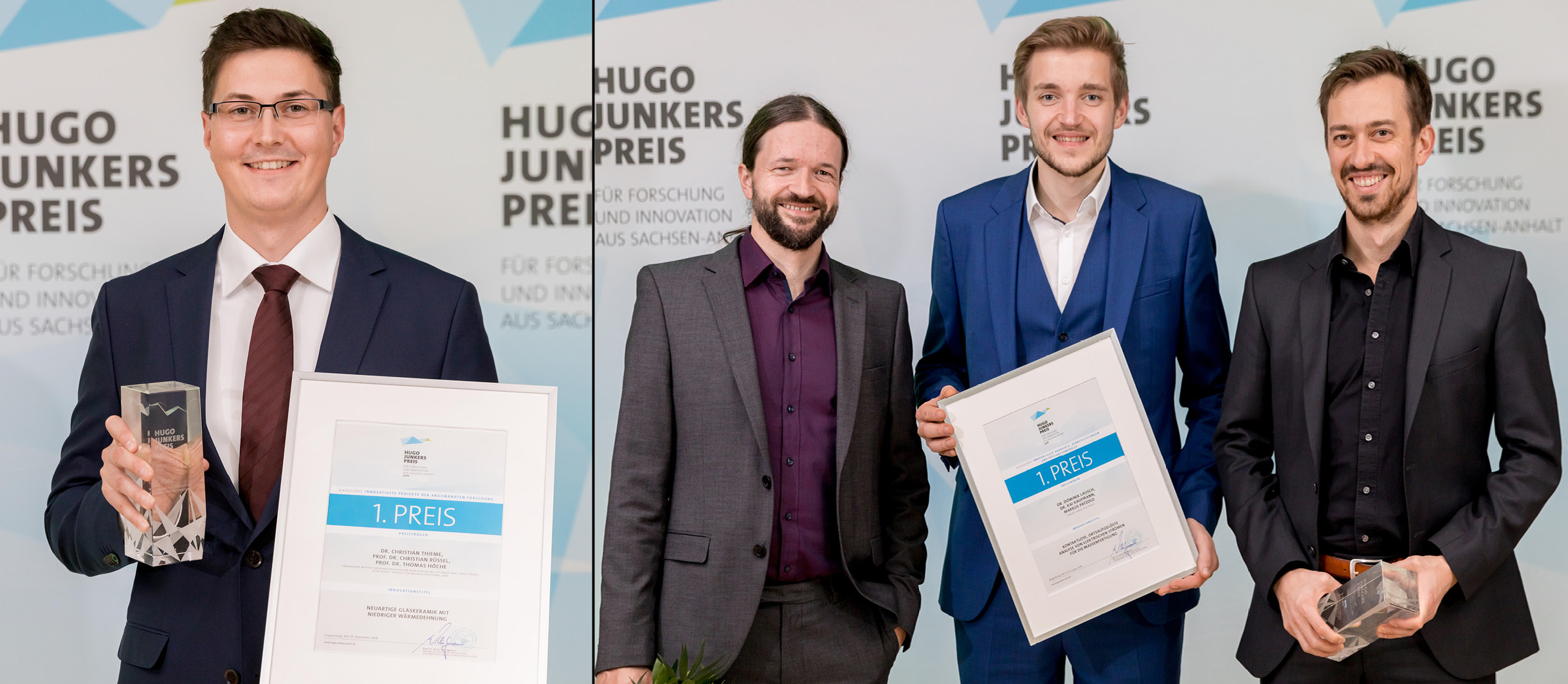New glass-ceramics and quality testing for electronic components
In two of the four categories for the research award from the state of Saxony-Anhalt, 1st place this year goes to the Fraunhofer Institute for Microstructure of Materials and Systems IMWS in Halle. Dr. Christian Thieme was awarded in the category of ‘Applied Research’ for the development of new glass-ceramics with low thermal expansion. Dr. Dominik Lausch and his team received the Hugo Junkers Award for the most innovative product: based on research at Fraunhofer IMWS, they founded DENKweit GmbH, which is bringing a device onto the market to conduct non-contact condition monitoring for electronic components using big data analytics.

“I am very pleased about the two awards because they combine many of the competencies we can offer our clients: the development of new, high-performance materials, excellent analytical methods and our in-house development of state-of-the-art equipment,” says Prof. Ralf B. Wehrspohn, Head of Fraunhofer IMWS. “I am particularly pleased that a start-up that has emerged from our institute has been honored. When colleagues successfully set up their own business using a research idea, this is the best evidence that our content is in demand on the market.”
Dr. Dominik Lausch, Dr. Kai Kaufmann and Markus Patzold took this step. DENKweit GmbH, which they founded, offers a new solution for measuring the condition of electronic components such as batteries and solar panels. The idea: the electrical current, for example in a solar panel, generates a magnetic field. A fault-free component has a specific magnetic fingerprint. If electrical defects are present, the electrical current, and thus the magnetic field, changes. This change can be measured in the finished component using a handheld device or during production using an inline device. The measuring data can be used to draw conclusions about defects.
“The idea is actually obvious; we were a little surprised ourselves that this solution did not exist yet. However, the cost advantages are considerable. We are pleased that the jury has recognized this potential,” says Lausch. In the past, for example, solar panels often had to be dismantled when a defect was suspected and then examined in the laboratory. DENKweit’s solution makes it possible to conduct the analysis during operation, non-destructively, contactlessly and in real time. “We are currently cooperating more closely with the automotive industry as the method is also well suited to examining individual battery cells. This will enable us to tackle a current e-mobility problem,” says Lausch.
The measured magnetic field data is sent to a cloud, where it is analyzed using artificial intelligence. The user then receives a corresponding interpretation of the data, such as a reference to the possible cause of the defect. The combination of machine learning and simulation-based analysis, which is used as part of this, was also developed by the researchers at the Fraunhofer IMWS.
Together with his team, Dr. Christian Thieme discovered the first new negatively expanding silicates in more than 50 years and integrated them into innovative glass-ceramics with low thermal expansion. The jury awarded this project first place in the ‘Applied Research’ category.
Glass-ceramics are used, for example, in cooking hobs and telescope mirrors. Their particular strength: they have no significant thermal expansion, so their shape remains almost the same, even with high temperature fluctuations. During production, finely distributed crystals with negative thermal expansion are produced in a glass with positive thermal expansion, resulting in a zero expansion material. However, in addition to mastering the process parameters and the particularly high melting temperatures, it is very difficult to find suitable crystals with negative thermal expansion, so only a very small number of companies worldwide are in a position to actually produce these materials.
The team led by Thieme discovered a new crystalline material with the composition Ba1-xSrxZn2Si2O7, which has this rare property. The great advantage is that the manufacturing temperatures for these new glass-ceramics are 100 to 200°C below those of conventional zero expansion glass-ceramics. In addition, the expansion behavior can be variably adjusted in wide temperature ranges. “This significant reduction in the melting temperatures is a great advantage. This saves energy costs while also allowing new players to enter the market, opening up new fields of application in high-tech products and for the mass market. What’s more, the starting materials are relatively inexpensive. The new glass-ceramics could therefore also be produced by small or medium-sized companies,” says Thieme. “The Hugo Junkers Award is great recognition for this project, with which we are also showing that world-class material innovations can be created in Central Germany.”
The winners received their awards at a ceremony in Magdeburg yesterday. A total of 82 projects applied for the Hugo Junkers Award from the state of Saxony-Anhalt, which was presented by the Ministry of Economy, Science and Digitalization in the state of Saxony-Anhalt in the categories ‘Most Innovative Basic Research Projects’, ‘Most Innovative Applied Research Projects’, ‘Most Innovative Products, Services and Business Models’, and, this year, in the special category ‘Most Innovative Projects in the Food Industry’. A jury selected 20 projects for the final and presented them there, after which the jury chose the winners.